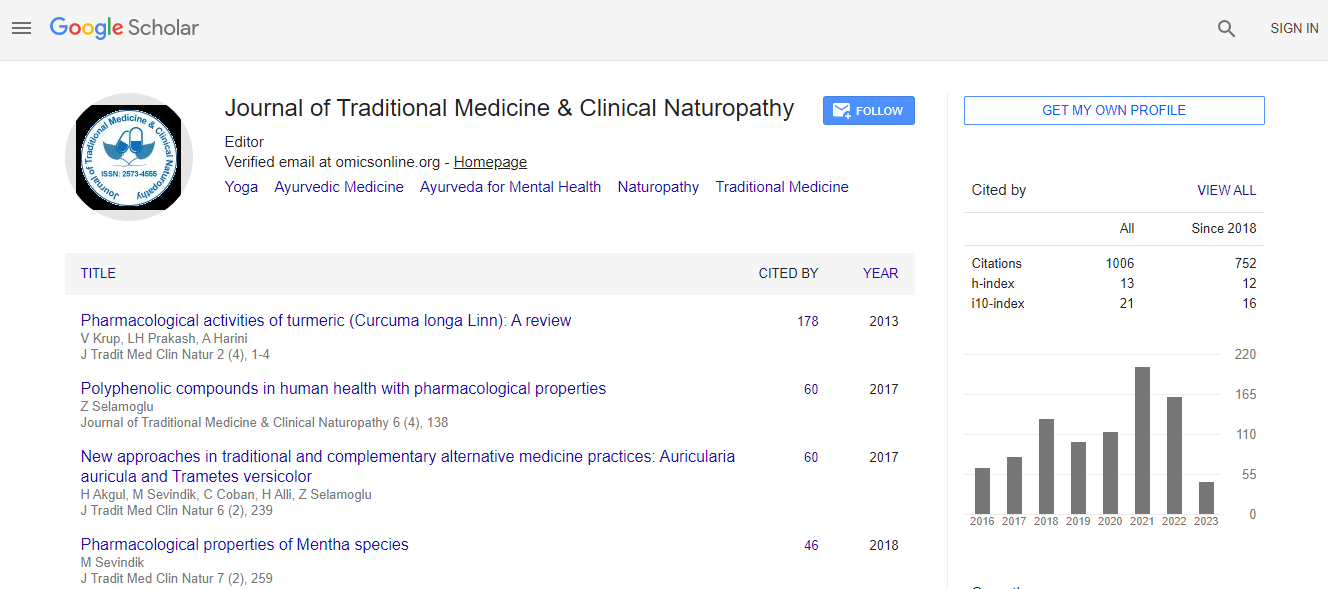Our Group organises 3000+ Global Conferenceseries Events every year across USA, Europe & Asia with support from 1000 more scientific Societies and Publishes 700+ Open Access Journals which contains over 50000 eminent personalities, reputed scientists as editorial board members.
Open Access Journals gaining more Readers and Citations
700 Journals and 15,000,000 Readers Each Journal is getting 25,000+ Readers
Google Scholar citation report
Citations : 1504
Journal of Traditional Medicine & Clinical Naturopathy peer review process verified at publons
Indexed In
- CAS Source Index (CASSI)
- Google Scholar
- Sherpa Romeo
- Open J Gate
- Genamics JournalSeek
- RefSeek
- Directory of Research Journal Indexing (DRJI)
- Hamdard University
- EBSCO A-Z
- Publons
- Geneva Foundation for Medical Education and Research
- Euro Pub
- ICMJE
Useful Links
Recommended Journals
Related Subjects
Share This Page
Comparative efficacy of Moringa oleifera and coconut oil-based mouthwashes versus chlorhexidine in reducing human oral microbial populations in healthy adults: A single-blind clinical trial
12th International Conference on Traditional & Alternative Medicine
Abu Bakar Shoukat
Quaid-e-Azam University, Pakistan
ScientificTracks Abstracts: J Tradit Med Clin Natur
Abstract
Introduction: Dentists have considered chlorhexidine as the gold standard antimicrobial solution against oral microbes for decades. The side effects of chlorhexidine and our historical reliance on natural remedies create the need for herbal alternatives. This study evaluated the effectiveness of chlorhexidine, coconut oil, and moringa on the prevalence of human oral bacteria using a singleblind, randomized clinical trial method. Methods: A total of 90 oral swabs were collected from consenting human participants on day 0 of the clinical trial. The participants were given either chlorhexidine (group A), coconut oil (group B), or Moringa oleifera (group C) mouthwashes and instructed to rinse for 14 days, twice daily. The participants were sampled again on day 14. Total plate count (TPC) and differential plate count (DPC) were done on both samples of each participant collected on day 0 and day 14. Standard biochemical tests identified bacteria. Results: Streptococcus mitis, Veillonella parvula, Klebsiella aerogenes, Streptococcus mutans, Bacteroides fragilis, Aggregatibacter actinomycetecomitans, Streptococcus pneumoniae, and Staphylococcus aureus were isolated from the plaque. All 3 types of mouthwash exhibited statistically significant differences in TPC and DPC of day 0 and day 14 when compared using a paired t-test (P value = 0.03, 0.01, and < 0.01, respectively). No statistically significant difference was noted in the antimicrobial activity of the three types of mouthwash when compared using oneway ANOVA, posthoc Tukey’s test. Conclusion: Our results show that M. oleifera and coconut oil have a bactericidal effect on oral microbial populations associated with caries and periodontal disease, comparable to chlorhexidine..Biography
Abu Bakar Shoukat works at Department of Microbiology, Quaid-e-Azam University, Islamabad, Pakistan.

 Spanish
Spanish  Chinese
Chinese  Russian
Russian  German
German  French
French  Japanese
Japanese  Portuguese
Portuguese  Hindi
Hindi 
